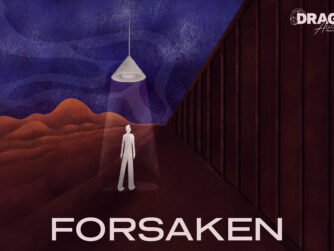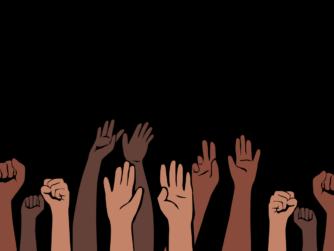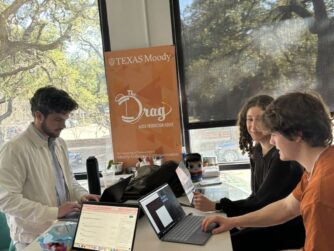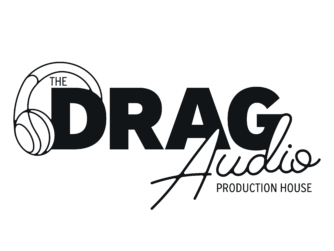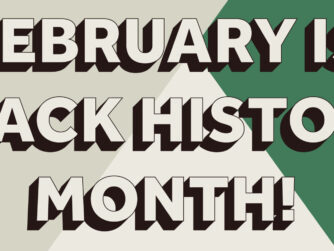The Drag’s Megan Parker and Meena Anderson intend to change the manner in which serial killings are discussed with “Devilish Deeds,” a new podcast coming soon from The Drag.
Throughout our Q&A, the hosts expanded on a variety of interesting topics related to the podcast and additionally provided advice for future student content creators.
Q: Why did you decide to start working on the Devilish Deeds podcast, and what kind of story are you looking to tell?
Megan: It’s important to tell the story of these servant women who were brutally murdered who didn’t have a voice back then. It’s important to share with others now about what was going on back then, especially because they accused predominantly Black men of killing these … women. And we don’t really know what went into that — a lot of racism back in the day, obviously. So, I just feel like it will be an interesting story to tell and for people to get insight about how Austin was in 1885.
Meena: We took this project on after a group of students had already started it. I don’t think there were any Black people involved in the making of it, which was like they were like “Okay, we should probably have some black people involved.” And me and Megan were like “Hey.” We don’t know who the killer is and we don’t solve that mystery in four episodes. Because everyone is dead, the lack of forensic evidence, how long ago it was…that’s not what we’re trying to do. With this podcast, there’s a solid attempt from all of us involved to do the opposite of how serial killing stories are usually told, in which the victims are erased and the killer becomes a public figure. On Devilish Deeds, it’s about the victims. These black women were getting murdered, and everyone was like “Damn, that’s crazy … anyways.” So, we’re going between the crazy and anyways.
Q: Where are you currently at in the production process?
Meena: We don’t have the finalized version of all of our scripts written. But episode one is finalized, episode two is on the way to being finalized and currently I’m editing episode three. Katey, our boss, does a detailed outline of (episodes) and we come in and we’re like “This could be misconstrued as racist or this isn’t, we could put more here, etc.” So right now, we’re talking a lot about the police in the episode that I’m currently editing. Because the investigation was done with no forensics … there’s a lot happening. A lot.
Megan: I’ve been smoothing — working on how it sounds when you’re actually recording. And of course, I’ve just been recording what’s written.
Q: In making the podcast thus far, what have been some of your favorite moments and what have been some of your biggest challenges?
Megan: The biggest challenge for me has been coming onto the project later on — I’ve struggled with finding good information to put into the scripts, because there’s so much of it, and then you’re trying to condense all of that to just four episodes. That’s why I don’t do most of the [script] editing and Meena does, because she’s really good at it. The most enjoyable part is just learning the story. We went on like a murder tour at the beginning of production, and that was really fun. I don’t want to say it was fun being where they were murdered — but getting a scope of the scene, that was nice.
Meena: I also really enjoyed the murder walk and would say it was a highlight. It was wild just being there, because where everyone got murdered is where downtown Austin is because it started in the center and grew outwards. So, we were walking along and our tour guide’s like “Here, this woman was scalped.” And then some dude is like “Woo woo woo! Party! 6th Street!” So that was funny … It’s finally an opportunity to actually focus on the victims and to instead think of it like this: How can we tell their story in a way that’s accurate and notably not racist? So that’s been really fun, but it’s also been a challenge. Because most of what we’re going off of are newspaper reports, which literally have “gang of bad Blacks strikes again in the middle of the night,” in the headline, and I’m like — okay well obviously this information is biased, so how are we going to work around that? And it’s difficult, because it’s something I’ve run into while editing too. I’m constantly trying to walk the line between “I want to say what I want,” but I also know some of the things that I want to say are going to make some white people upset, and I don’t want to do that. They’re some of our listeners, so that’s one of my biggest challenges right now.
Q: What’s the process like for picking a conversation topic for each episode?
Meena: Like I said earlier, in the third episode we’re talking a lot about investigation tactics — implied very liberally here — employed by the police. Where I see room for conversation are a lot of things that you can very clearly tie back to right here, right now. So many of these issues, we love to ‘akeke’ and pretend that racism is over. Like ‘it died with MLK.’ No. Obviously racism still exists, and it’s silly to think that it doesn’t. Specifically in episode three, one of the marshals arrests and basically brutalizes this man who is accused of the murder. But he falsely arrests him. He was just behaving rowdily in a saloon. But then he’s like, I think you’re a murderer because you’re acting a fool. He makes up this whole story. He was just like “He actually ran through a bunch of bushes, and that’s why he has a black eye. It wasn’t me.” And everyone was like “Yeah, so true, so true marshal!” Obviously, it’s a little harder to be a white supremacist in the police force now. But you can still see how the founding of these principles and this behavior in the rudimentary police departments across the south and across the U.S. during this time leads to things like George Floyd, or Eric Garner. And I think those are important conversations for us to have, and that I would like to have.
Q: In the end, what do you want listeners to take away from listening to Devilish Deeds?
Meena: I think we have an opportunity here to really reframe the way that we talk about serial killings. And I think that we’re giving listeners an opportunity to unpack how true crime is told. There’s a lot of room for trauma exploitation in true crime podcasts. Hopefully with this podcast, because it’s more historical, we’re a little more distanced from it but that also gives us more room to really unpack and talk about these things and contextualize them for a modern audience. What I mean by that is okay yeah, serial killers are interesting objectively and it’s interesting to find out what makes them tick. But we can definitely think more critically about them and we can also be kinder to victims across the board. And not just of serial killers, but of so many other terrible violent crimes.
Q: For student content creators, what do you think is the most important advice you can offer?
Megan: Just go for it. If you have an idea, run with it. We all have our own things we want to pursue in terms of content and podcasts, and there’s an audience for you, no matter what it is.
Meena: Be selfish. Know that this is your podcast, work on it, own it. Because people are going to be silly with their reviews. My roommate is the host of season two of Darkness, and the first day it came out, she was like “Oh, people are criticizing my voice on Apple reviews.” And I’m like, “You did that sh-t.” You went in there, and you recorded. I witnessed her skip all of her classes to work on scripts and recording. But at the end of the day, she has an absolutely kick-ass top ranking podcast that not many students will have the opportunity to have in their portfolio. Obviously, I’m not saying neglect all of your other responsibilities. But, it’s a piece of work … get on that grind… It’s also different because this is something I’m enjoying doing. It’s not just me being like ‘OK, well let me get my physics homework right now.’ It’s an important project and it’s interesting. Even though it can be daunting, my advice is to power through and be selfish.



